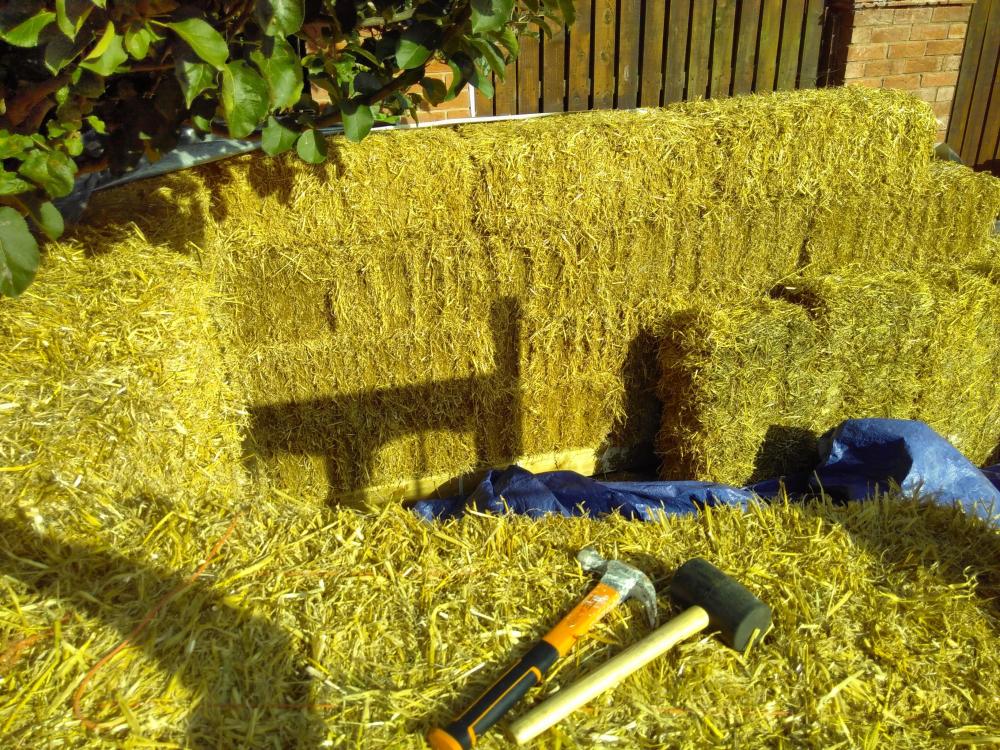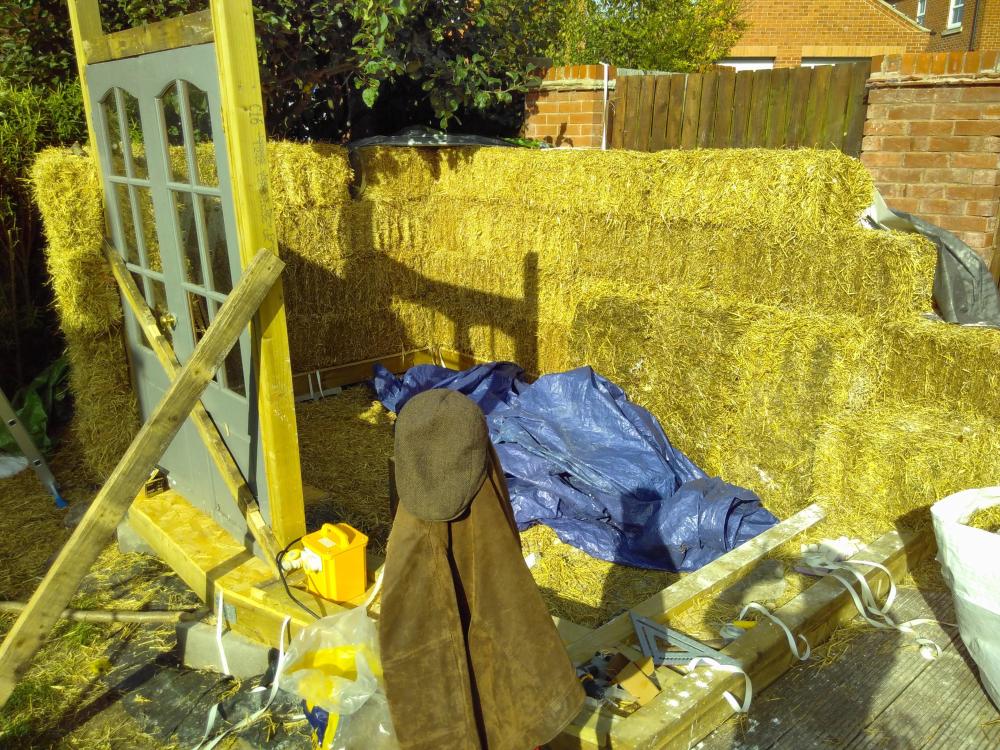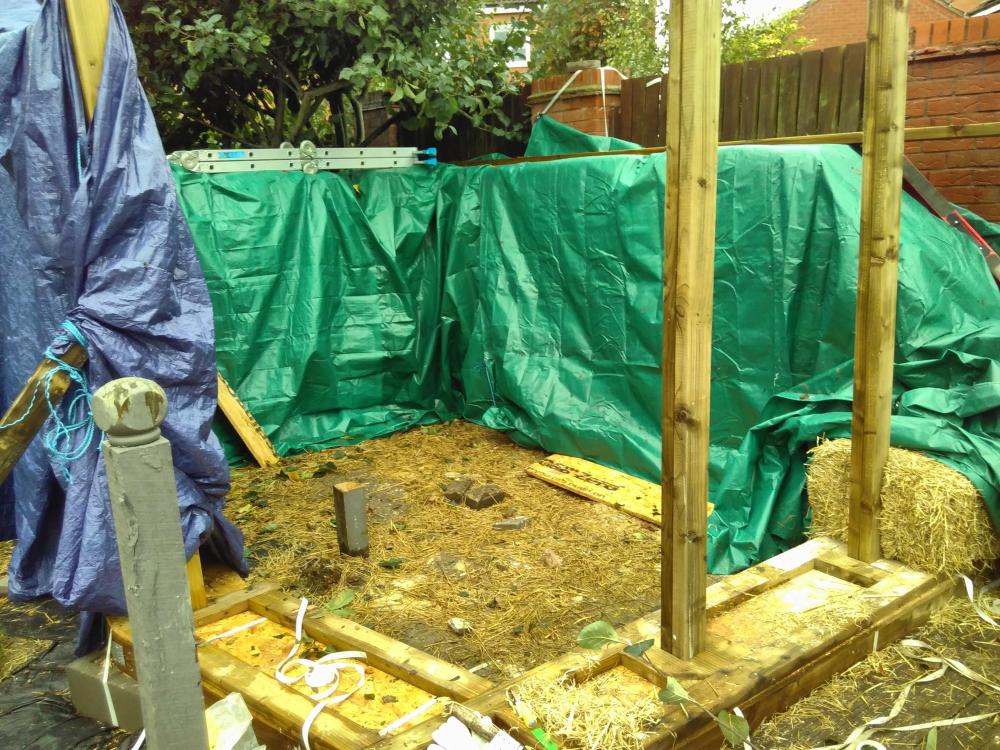Leaderboard
Popular Content
Showing content with the highest reputation on 04/23/24 in all areas
-
We had our first air tightness test today and achieved 0.25 ACH!! 🎉 Absolutely chuffed to bits with that. We have spent a lot of time taping every possible penetration, but I was still anxious in case we hadn’t quite been as scrupulous as needed.5 points
-
I would walk away. There is no way you can build a garage on top of next doors drainage field, even before you think about distances to the house. Unless an off site drainage solution was available for both houses I would say the plot is not viable. The minimum needed is permission from the land owner to the south for drainage fields for both properties to be installed under that field (assuming it is a field not other houses). If I was the vendor I would be looking for such permission, and then thinking of installing a large TP to serve both houses and the drainage field for it, then sell the plot as a serviced plot. That is about the only way I think it is viable.2 points
-
Dunno wot you all fink, but this is sooooo much better than following Grand Designs..... Its not often that I read and re-read many posts as carefully as I do this series.2 points
-
You could present the sellers with the problem and your view of it and allow them to investigate whether they have any solutions.2 points
-
Now that I’ve looked at the block drawings I’d walk away. I wouldn’t want any aspect of my house relying on someone else’s land but nor would I want any aspect of someone else’s house relying on my land. Everything to do with our house is in our land. It’s easy to get over invested in a plot of land as you can start to see your finished house etc. It’s what I did on a previous plot but my wife hated it. We found a much better plot that very day. My dad used to tell me that if there’s doubt about something then there’s no doubt. So I’m with Russell, walk away.2 points
-
2 points
-
Hi all, I’m Welshdrum, I moved to Carmarthen in 2021 and bought a small holding from the early 1900s, I have very little diy skills but am learning as I would need to be a millionaire if I paid for all the jobs I needed, but for the big stuff I get the pros in1 point
-
Hi, I’ve been a member for a while but have been mostly sitting, getting frustrated, waiting for our planning decision. 2 weeks ago we finally got our approval for a strawbale house in the village of Minard, in Argyll and Bute. Now we’re moving into the building warrant stage and at least this time, we’re prepared for a wait - our planning took ten months after being told ten weeks. I’m a bricklayer by trade and this one is going to be the last house I build. 61 years old and I’ve had enough, but definitely looking forward to getting stuck into this. Graham Walker1 point
-
I'll let you know next week....it apparently can pick up a pinprick hole! So have been recommended to do it, before the Green Roof goes down.1 point
-
AHH. I used optimisers that made everything safe (1v per panel) until commissioned. Good point tho.1 point
-
I did 90% of our install myself, spark did the connection from inverter to the consumer unit and provided the safety check paperwork. Fitting the panels and stringing them together is pretty simple stuff.1 point
-
Looked in to this. Sedum plugs are much cheaper than the mats. Just need to be a bit more patient and do more maintenance in the first year. I think green roofs are great when done right. Go for it.1 point
-
yep. it's a pretty simple solution albeit with lots of layers. I could've done it a lot cheaper myself but I wanted a guarantee for the flat roof covering (was also required for our warranty) so I got a professional to do it all. from insulation to waterproofing to green roof to edgings etc. including the hire for a telehandler was about £400/m2 to give you an idea. so, as I say, £100/m2 seems pretty cheap.1 point
-
Just because you have to follow building regs for a new build - doesn't make it a new build. If your conversion process involves knocking the place down and starting from nothing, you are doing a new build. If you have a building you modify from one thing to another it's not a new build. You will need to provide your planning permission and completion certificate to the vat people. If your planning permission is for a conversion you are doing a conversion.1 point
-
Theoretically it is clean. If it has had any pretreatment and is then distributed over this huge area, the bugs will have cleared it. But I fear that most systems are incompetently built and incomplete. Therefore you should get independent testing, paid for by the vendor. Then there are the redundant trenches beneath the building. They are likely to be unsuitable for building on. You need a strategy for this and some cost set aside. I'd guess that the best solution might be trench footings to beneath the drains, then a suspended beam and block floor. Slightly more expensive than ground bearing but not too bad. And even allowing these solutions, you are at risk and the site is blighted. It should be considerably cheaper than a site without this challenge.1 point
-
I get all my grid from Sheffield insulation They stock all the framing and most tiles Except the fire rated tiles1 point
-
Yes - we did. Get an electrical cert which includes the PV. Ours was in the garage, so on the garage elec cert, then go through the application process with the DNO. Ours was with NG. You obvs have to fill in the forms and your inverter needs to be G100 compliant. You can find the certificates on the inverter database. On the forms you can put down that it is a self install, there's no requirement for MCS. Then just apply for Octopus Go - I think they still have the admin charge but essentially they contact the DNO to make sure you are registered with them and then it should go through with no problem. I think I put a link to a Victron forum about this on another post a month or so ago- from that, I think that suppliers are not allowed to insist that the PV is an MCS install. If you need the link, I'll try to find it again and repost it. Simon1 point
-
1 point
-
Oh yes, my original idea was straw bale build and i would have if I was much younger. I will be following the other straw bale thread. I wrote to channel 4 years ago suggesting they start a programme called “green designs” but they did not reply 🤷♂️1 point
-
1. If the vendor doesn't appreciate the issue, then it is polite to advise why you will be ducking out. They may then offer a huge discount. 2. If the vendor knows and is concealing the issue no harm in applying 1. You must not have their drain under your house. And the ground has been messed with INsist they rebuilddrains on their land. Plus doundation issues. Your drains. restricted £50k discount? Or walk away. even then you need a derailed solution before committing.1 point
-
surely the plumber is working backwards? If boiler and burner are running for now, just throw a pump in it. *then* look at the other stuff. Seems he's got his OFTEC profit head on... And if no-one is likely to take a hammer to the oil tank, leave well alone. Whilst it may be a little more brittle than it used to be, that's more likely just the surface drying out, like grey car bumpers do.1 point
-
If I remember correctly our Jeremy even had his council tax paid for by incoming PV payments over and above his outgoings.1 point
-
Brilliant. When @joe90 had his done, I watched the meter recording it as Old Joe ran around with a tube of silicone. I found one leak (air intake to the WBS), but forgot to mention it, but that is because I am a bastard.1 point
-
To answer your original question, yes you can reclaim VAT on flooring with the exception of carpet and carpet tiles. Be aware that if you’re having it installed then the installation should be zero rated rather than reclaiming.1 point
-
I have fitted them 14inch in 2 customer houses. One house had 4, 3 flexi tube and 1 rigid, the rigid is a lot brighter than flexi so I would go with the 10inch rigid in the middle. If it has no windows now, even a small amount of light will make a huge difference.1 point
-
1 point
-
1 point
-
1 point
-
We had one in our last house for an otherwise dark landing. It worked very well indeed. But if I had a £ for every time a visitor said they could not find the switch to turn the landing light off.1 point
-
1 point
-
Ended up pretty much as per the drawing above, except with 100mm pir, and osb instead of ply. We also went for Rationel aluclad frames instead of pvc. Standard concrete cills, though might have been better with ones with a narrower part for the window to sit on.1 point
-
Have you thought of resilience bars as you are thinking of adding another layer of plasterboard? As @Iceverge says, density is not everything. Sound proofing is as much to do with creating destructive interference patters for the soundwaves to interact with themselves and increasing the linear path that the sound energy travels. The longer the path, the greater the reduction. It is an inverse square law, so for every doubling of distance you half the intensity.1 point
-
Don't get hung up on the density of insulation for sound proofing. The main job of fluffy insulation is to dampen the reverberations or "drum effect" in a cavity. Concentrate on sealing each and every air path. Perimeter, board to board, wiring holes. Downlights are a disaster. The add some fluffy insulation for reverberation. Then add mass. Denser insulation of course helps but it's an expensive way to add those extra kgs. Standard plasterboard, soundbloc and OSB are all about the same price per kg and mug cheaper than insulation. If you're feeling really cheap sand in bags or plasterboard off cuts will all help if shoved between joists above the ceiling. Finally decouple the floors although this is more important for impact noises. Strips of carpet or rubber above the joists and resilient bars underneath.1 point
-
Hello, Had a tortuous route getting planning. Ended up going to committee and was all very negative comments from committee members so was fearing the worse, but much to our surprise a majority voted in favour. Think the lack of a 5 year supply may have played a big part. Pre-commencement conditions discharged and build underway. Another obstacle since started had 3 other plots on the site for self build but no takers. People seem frightened of the whole process and unaware of build costs. So left with a big problem to solve.1 point
-
DHW with an ASHP gets quite nuanced. The COP like @JohnMo says is closer to 2.5 Vs the 4+ you would expect for a well set up space heating. Then you are limited really to about 50⁰ storage temperature for efficiency so you can only store about half then energy that you can with an immersion driven UVC at 70⁰-80⁰. If you operate on a TOU tariff like we do the sums get interesting. We can heat all our 10kWh of DHW overnight in a 300L direct UVC for 18c/KWh or a cost of €1.80/day. I estimate that if we had an ASHP we would heat half per day and half at night. 5kWh* COP@2.5 * 18c/kWh = €0.225 5kWh * COP@2.5 * 36c/kWh = €0.45 Total €1.13/day savings. Assuming that an ASHP UVC would be €1000 more that a direct one and a heat pump would be €3000 and DHW was half the use load you could say €2000 was the extra spend on the DHW side. Payback 5 years. Pretty respectable. Unless you add solar PV. Take a 4kWp system and dump say 3MWh into the DHW/year. Then the averaged daily savings drop to €0.2. Payback for an ASHP becomes 27 years. TLDR A2W ASHP is probably worth it for DHW unless you plan for solar PV anyway.1 point
-
Welp, storm babet has been and gone and it's all still standing.We got winds of ~50mph and plenty of rain, but it wasn't particularly noticeable in the garden - it really is sheltered. Got to four bales high on the bit I've been working on, drove those hazel spikes in, then got it all tarped up. Once the storm passed, I got the uprights for the window in, and (no pic of this) got the first bale down between them. Lots of notching. Managed to pick up an alligator saw cheaply, which is helping a lot with that part. Plan now is to get the rest of the walls up to four high and staked; get the windows in; then build the wallplate while the top of the wall is still fairly accessible. Ideally you do it while the floor plate is still accessible so you can use it as a template, but I was pretty tired of wood at that point ^^. I've got the dimensions written down somewhere. Once that's ready, I can haul up the bales for the final two courses; wallplate on; compress; build the roof; re-compress; build the floor. Then in spring, lime render inside and out. Pics - two before the storm, one after: The gap in the fourth course on the west side is *hopefully* going to turn into my bubble window, with a lot of shaping. I expect it'll be porthole-sized by the time I'm done.1 point
-
@Sparrowhawk Distaster strikes at my end. Thanks for pointing out my error and the heads up @Nick Thomas Can you all for give me please. I just use my own name.. not forgotton that yet.. but time may tell as I age .. further.1 point
-
Yes you were as it is your project and love what you are doing and your approach. I'm chipping in with partly my SE hat on in the hope you will make it safe but also to encourage you as best I can. On the other hand you have been on a course, know other stuff, taking an innovative design approach so we are all learning from each other. This works both ways.. I learn from you and visa versa. Where I think you are going off track I say so and try and justify why I think so. Think about this another way.. a garden room on average adds 20 -25k to the value of your house (think it was Which magazine that said something like that).. Imagine if you can do this for 4k, justify that it is safe and when you come to sell.. now you have pocketed 20k tax free, have enjoyed building it and using it..1 point
-
Well done having a go at this. Unfortunately it's not a simple task... I can see you have had a go at calculating the sliding resistance. Call this the global behavior of the structure. I have not looked at you calcs in depth but you are missing two vital things, the first is factors of safety, second and fundamentally when the wind hits the side of the building some goes round the sides and some over the roof. But there is already wind over the top of the roof so you need to squeeze this extra air into the envelope around the building. This increases the air velocity and particularly a flat roof starts to act like an aircraft wing and the roof lifts up. The uplift forces are large so you need to deduct this from the self weight of the structure. Now normally the sliding check is fine and not the critical check as say masonry structures are heavy.. bales less so. The structure could also hold together and overturn.. roll like a ball. My gut feeling is that even with a bale building this will probably not be the critical check. What I think will be the critical check it to make sure that the columns you are forming on the front elevation are able to carry the wind loads as individual elements. Around the sides of the door and at the corners you could get very big uplift forces.. unless you make the roof very stiff. In other words I think that even on a windy day the front wall will start to skew sideways (you also need to transfer what are called shear loads and the bales I don't think will do this well).. then you won't be able to open the doors... take this as an early warning you have got it wrong. To sum up the above. Wind loading is complex, there is a lot to it and the knock on effects are significant. For me.. you have a limited life structure, not occupied all the time.. you could compare this to an open sided farm building in terms of sideways stability (your front elevation with windows / doors), a marquee or similar temporary structure. When we design these we take a more pragmatic view, settlements are less important. What we say is we need to stop two main things happening. The first is that it does not suddenly collapse (without warning) and second is it does collapse say in the wind that bits don't fly away and hit people first and then other buildings ect. I think you really need to stop the front of the building moving sideways and will struggle with bales. One solution that springs to mind is to make the frame around the doors very stiff and strong so it resists the sideways forces. We do this when making big openings in the walls of buildings that are intended to hold things up and stop the building moving sideways. You door frame could be a portal (two columns and a top beam very well connected together) or a box frame, I think this may be best to look at first... the box frame You could make the structural door frame a feature to compliment your attractive design? To get your head round how the sideways forces work make a portal or box model out of 3 or 4 members.. bits of wood. Hold it at the bottom and push it sideways and see what happens. Look carefully you'll get a downwards load at one side and an upwards load at the other... this uplift load is the dangerous one! This load needs to be resisted by tying down. Encouragement! I bet there are loads of folk that would love to be able to do what you're doing and can see you are making a great effort. If you can do this for 3 -4k materials folk will chew your arm off! One way of really understanding this and how it will roughly behave is to get a cardboard box (or a few), cut holes in it to the scale of your windows / doors. Make a roof for it and pin / tape it with match sticks ( to represent your Hazel sticks) to the top of the box. Tape the thing to the dining table and start to push it sideways.. see what happens. This can be great fun for both adults and kids.. before you test it to destruction observe it first or you'll use a lot of boxes! This might sound a bit daft but this is how we teach SE's! Keep posting!1 point
-
I've been looking forward to getting to a point where I can park my car in my driveway again, and finishing my July Post with a part 2 here to mark a finish to my Driveway project finally! Took a bit longer than the two weeks I was hoping!! I just finished adding up the damage and it was @ €7.2k all in all. I think the length of time increased the costs as there were days where I couldn't get to use the compactor and I had to get it back a few times to progress the project on. Some notes observations below: The big Diesel Compactors are heavy duty brutes but also take a specialist skill to start. They are all draw cord and they pulled the arms off me for 25 minutes before I gave up. I was shown how to start it but had to return it to my embarrassment and downgrade! Drainage took a lot longer than I imagined, plumbing in the drain channels was very difficult - I replaced both gully traps and one was encased in concrete by the original builder! Just getting the right couplings and things to fit took me a while to figure out. SDS comes in different sizes, SDS Max chisel bit wouldn't fix my SDS drill so ended up buying an SDS Max drill off Screwfix! I now own 3 angle grinders, started with none! A Screwfix one that won't let me change the grinder to anything else, then a 5" DeWalt, then a 9" Makita. I prefer the cut using this to the block cutter but the dust is gruesome! Grab Hire worked out well, took away 2 x 20 ton loads to clear the site and was able to drop two loads of MoT 804 exactly where I needed them. All moved by hand / wheelbarrow at that stage, was very difficult to find anyone hiring a skid steer for one day. Lots more sand and cement than I thought, all mixed with a wheelbarrow! Using a digger is scary when it starts tipping to the side due to doing something stupid! Two injuries: #1 drilling concrete screw into wall for new side gate, it got stuck and the SDS drill spun violently out of my hand, 6 weeks sprained finger didn't help! #2 seagull poo'd above and dropped inside my goggles, put them on and got acid splash into my eye. Now store goggles between jobs closed to the sky! Broadband issue is fixed - tree roots crushed the pipe on my neighbours property, stump was still there for years. I tried to find the pipe to create a new junction to my new house hear the boundary but only ended up finding the gas pipe by accident with the digger, just the tape over the pipe, where it shouldn't be - should be out on the road according to the gas map. Went to the other end near my old house and finger traced the pipe to a point near the new boundary and created a shore there. Thankfully after two years complaining a crew came recently out to remove said stump, run new draw cord and I'll have no issue getting broadband into my new house now, 1 less worry So I've to finish the very front and put up two more concrete posts and panels. I've to grout using Rompox jointing compound and see how long that takes. Hopefully it will keep the weeds away! But at least I can relax a little bit and use the driveway again. Would I go it again?! Well, I learned valuable lessons, to pace myself, what I can do when I put my mind to it, very useful for my self build next year. My body is certainly feeling the pressure and I'm glad I'm in my 50's and not my 60's!! I overestimated how much work was involved but learnt a lot in the process, not just specifics but about groundworks and hiring plant and grab hire which was new to me. I did get a digger & driver for a day and could see how they made short work of things compared to my efforts so picking and choosing where to spend money best is a wise course of action! Full costings below if interested! I Kept all my receipts for idle curiosity! All inclusive of VAT. Best of luck to anyone out there thinking of doing same! My Driveway area is 75m2. 7265.52 Total 1984.38 Tobermore Paving 210 Paving Block Cutter (€400-sale afterwards) 200 Recessed Manhole Covers 32.69 Spade 690.78 Sand, Easypost, Cement,Gravel 100 Diesel Compactor - unable to start, returned! 32.66 32mm plastic waste pipe as screen level 300 Compactor Rental 39.92 Donegal Quartz stone 89.95 Dewalt Angle Grinder 102.57 Sand/Cement/Gully 44.95 More Gullys 35.47 Lubricant / Sealant 147.08 Donegal Quartz stone & gravel 24.48 Plastering Sand 76.65 Sewer Gullys 11.32 Sewer Pipes 19.56 Sewer Pipes 19.19 Concrete Screws 200 Hire Compactor 500 Hire Digger 19.58 Plastering Sand 86.35 Manhole Cover 292.15 Plant Rental 69.65 Cement mix & misc 45 post and line levels 93 replacement wheel for wheelbarrow & cement 17.7 side gate lock and hook 5.99 petrol can 284.55 rompox jointing compound 12.45 tape 257.31 sds max drill 82.04 kpost 7.15 coupler 38.8 drain caps 15.95 sds max drill 37.25 bits and sockets 38.95 draper cold chisel 700 Grab Hire - removal of concrete/topsoil 300 Delivery of MoT 8041 point
-
0 points
-
What a (expletive deleted)ing horrible wood burner, I would knock a million of the price, and another million off because there is a swimming pool. And then maybe another million off as it is not a pretty house. Then the negotiation could start on the price.0 points
-
OK so here is a neat little pad in the SE, with price tag to match, that has very nice credentials on the SAP front but can rival Drax when it comes to burning wood 🪵 and they have 2 ASHPs, loads of Solar PV and 2 Solar Edge batteries- but can anyone afford it? https://www.rightmove.co.uk/properties/144719090#/?channel=RES_NEW0 points
-
He was one of the last able to sign up to the FIT, sadly gone by the time I was ready to do so. No such golden goose for us now. Until the end of last year I was still getting the FIT from our old house, that paid for all our electricity used in this one, but that went with the house.0 points
This leaderboard is set to London/GMT+01:00















